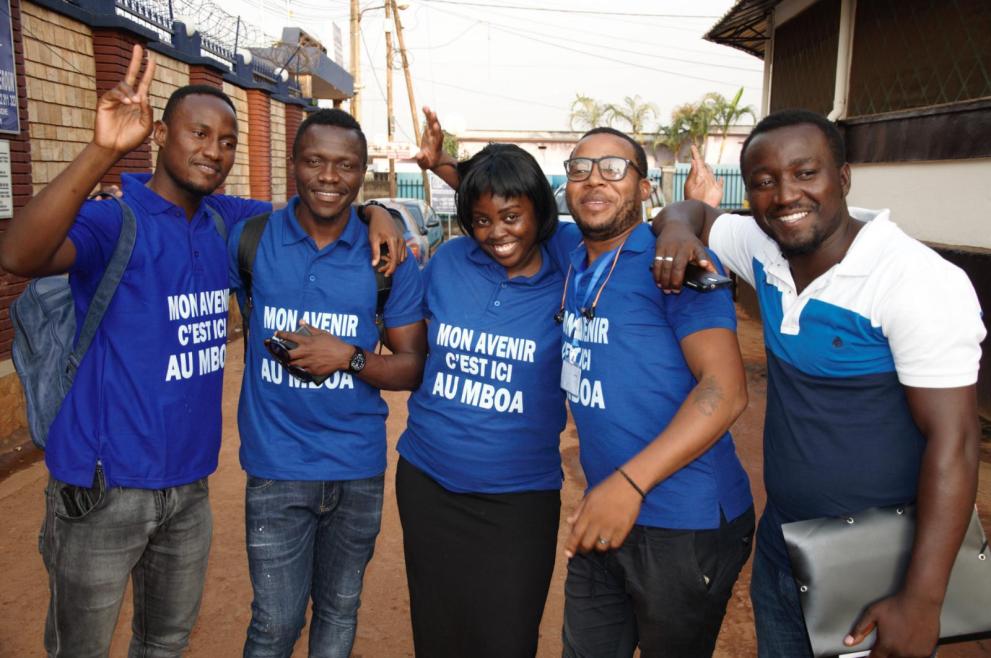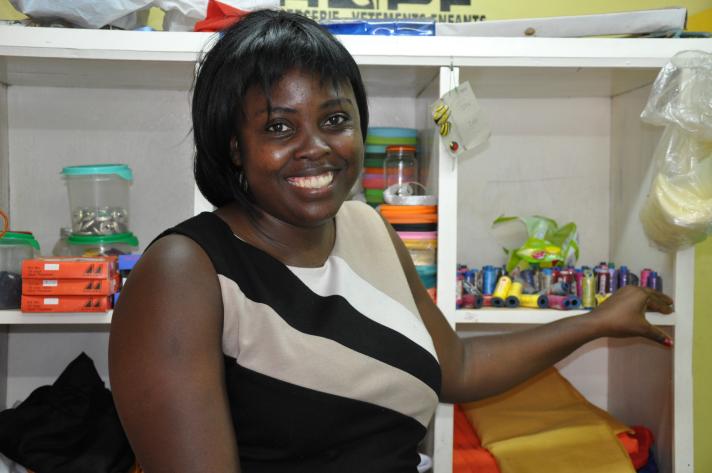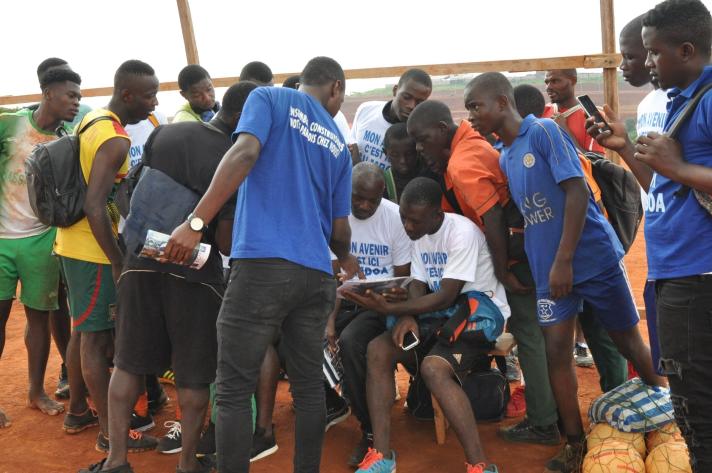
It is 8 AM on a Monday morning and a mist nearly shrouds Yaoundé’s Ahmadou Ahidjo Stadium. This is one of the last cool days before a long dry season begins.
“Omnisports” as the stadium is often called, is centrally located in Mfandena, at the heart of Cameroon’s political capital, which makes the stadium’s esplanade an ideal meeting place for all kinds of events — from public fairs to educational activities.
Today, 53 aspiring footballers meet outside the stadium complex to take part in an awareness-raising session on irregular migration.
The six volunteers leading the activity are Rafiatou, Jean-Bernard, Thierry, Patrick, Abdoul and Barthélémy. All know what irregular migration means. They had left Cameroon with the hope of building new lives elsewhere, but things did not go as they had planned.
Back home, they formed an association to inform their peers of the dangers that exist along West Africa’s main migration routes.
“The idea of OEMIT — our association- was born when we were in detention in Libya,” said Thierry, the group’s vice-president. “In fact, when the human being is faced with such misery, he cannot but think about what to do to make sure his brothers and children will not suffer the same — even if he is not sure he is going to survive.”
OEMIT stands for Organisation pour l’Eveil des Jeunes sur la Migration Irrégulière et la Traite des Personnes (Organization for Youth Awakening on Irregular Migration and Trafficking in Persons). All its members, except Rafiatou, met in detention in Libya. When they speak of the dangers of irregular migration, they speak from personal experience.
Rafiatou had been told by a friend that it would be easy for her to find a well-paying job in Mali. She was convinced. In 2014, she cash out her savings and purchased a one-way ticket for her and Ryan, her one-year old son, to go to Mali.
In Bamako, she worked as a logistic assistant in a small family company. When the company went bankrupt a year after Rafiatou’s arrival, life became a nightmare. “I decided to try my luck in Algeria,” she explains.
After 5 months there, Rafiatou was returned to Mali, explaining. “That was where I got in touch with IOM and I decided to come back to Cameroon.”
Before leaving, Rafiatou had studied Banking and Finance. But she only managed to complete two years of her degree because she lacked funds for her tuition. “My mother had passed away and it was difficult for me to work to fund my studies, and study at the same time,” she said.
The precariousnes of her situation is what pushed her to leave. After she got back to Cameroon with the help of IOM, she decided to open a tailoring shop with a mini haberdashery.
“I work during the day in my shop and in my free time, I volunteer with OEMIT. Young women and girls must know what the risks are along the way”.
OEMIT targets final-year high school students and aspiring football players in the suburbs of Yaoundé. Barthélémy, one of OEMIT’s founding members was himself a footballer before he decided to leave Cameroon.
“During the football trainings [in Yaoundé], many of my peers dreamt of leaving Cameroon for a chance at becoming professionals in Europe”, he explains.
But many are not aware that success is a process.
“People unfortunately think they will get to Europe easily by taking the road. But that is not the case. You will need ‘papers’ [ID documents], and more importantly, you will need a formal invitation from the team that will welcome you”, he adds.
The meeting at Omnisports, funded by the EU-IOM Joint Initiative, is the first of four OEMIT is organizing around Yaoundé. After the training session, the footballers gather around and the OEMIT volunteers begin to share their stories with them with the hope that it will encourage them to reconsider taking the perilous journey through the Sahara.
A year ago, in November 2017, Jean-Bernard, Thierry, Patrick, Barthelemy and Abdoul were among the 250 Cameroonians who returned to Cameroon from Libya on a flight chartered by IOM, the International Organization for Migration thanks to the EU-IOM Joint Initiative for Migrant protection and reintegration launched in 2017 in Cameroon.
In addition to their day jobs and businesses, the members have committed becoming living examples that young people should not only look outside to build their future.
“Only someone who has gone through what happens in Libya can speak to young people and be listened to. When I left Cameroon, I believed that it was only in Europe that I could succeed. My experience has taught me that I can succeed in Cameroon too. Step by step, with patience. As the saying goes, Rome wasn’t built in a day” said Patrick after the event at the stadium.
Through this series of gatherings, OEMIT hopes to enable young Cameroonians to make informed migration decisions.
“I lived hideous moments in Libya and I used to ask myself daily if my brothers who were behind knew what expected them ahead. I left Douala and arrived to Garoua [in northern Cameroon] before I took the boat to cross the Benue River into Nigeria”, said Jean-Bernard, OEMIT’s founder. “From there, I continued to Niger where I was sold for the first time for 50 000 CFA”, he added.
Jean-Bernard spent six months in a detention center in Libya, where he met OEMIT cofounders.
This difficult and often tragic reality of irregular migration is sometimes eclipsed by hopes and dreams of better futures.
The programme is part of the larger EU-IOM Joint Initiative for Migrant Protection and Reintegration which facilitates orderly, safe, regular and responsible migration management through the development of rights-based and development-focused policies and processes on protection and sustainable reintegration. The EU-IOM Joint Initiative, backed by the EU Trust Fund, covers and has been set up in close cooperation with a total of 26 African countries.
Details
- Publication date
- 2 May 2019
- Region and Country
- Cameroun
- Thematic
- Improved migration management
- Partner
- International Organization for Migration


